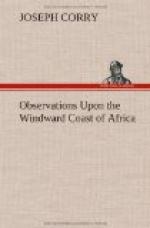Mr. Hodgkin, with his people, then in possession of the factory, accompanied me up the Port Logo branch the following morning, taking a number of towns in our way, and visiting the chiefs. The course of this branch of the river is extremely serpentine, and is navigable for light vessels to a little way from the town of Port Logo which is now the residence of Alimami, a Mandingo chief, who assumes the title of emperor. The banks are overgrown with the mangrove tree, interwoven together, so as to form an almost impenetrable thicket, excluding the air, which, with the extreme heat of the sun, and the noxious insects which are extracted by its rays from the swamps and woods, renders this navigation intolerably oppressive. The chief part of its trade is in slaves, camwood, and ivory, the latter, however, being small, although Port Logo commands a very extensive back country. When we came near the town of Port Logo, which is extremely difficult of approach at low water, we announced our visit by saluting in the manner of this country, which is what they call bush firing, or in other words is a continued irregular firing of musquetry.
It was soon discovered who we were, and crowds of natives flocked down from the upper town, which is situated on the declivity of a hill, to give us service, or to pay their respects. Our first visit was to Marriba, one of Alimami’s head men, and a resident of what they consider the lower town.
Upon our arrival at Marriba’s house, we found him at his devotions in the palaver-house, a shed under which the natives daily assemble to pray, or discuss public affairs. He received us with every demonstration of regard, and immediately offered his services to conduct us to Alimami. The old chief preceded us, with his long gold-headed cane, and our rear was brought up by a number of armed men, who had assembled to give us a favourable reception. Our salute had pleased Alimami, and being before known to him, he was determined to shew us every respect. The heat of the sun was almost intolerable, and before we arrived at the top of the hill where the imperial palace stood, I was nearly exhausted. The entrance to this large square of irregular mud buildings, is through a narrow passage or gate, forming an oblong square of mud, covered with thatch, and facing Alimami’s house: we were ushered through this by one of his head men, and proceeded in the order we set out to Alimami, who was seated at the top of the square, surrounded by his chiefs, upon a mat spread upon a raised bank of mud, dressed in a turban, after the Turkish fashion, and a loose manding, robe, or shirt.




